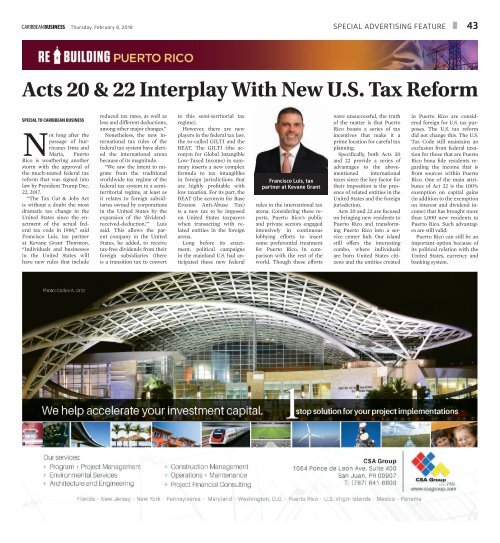You also want an ePaper? Increase the reach of your titles
YUMPU automatically turns print PDFs into web optimized ePapers that Google loves.
Thursday, February 8, <strong>2018</strong><br />
SPECIAL ADVERTISING FEATURE<br />
43<br />
Acts 20 & 22 Interplay With New U.S. Tax Reform<br />
SPECIAL TO CARIBBEAN BUSINESS<br />
Not long after the<br />
passage of hurricanes<br />
Irma and<br />
Maria, Puerto<br />
Rico is weathering another<br />
storm with the approval of<br />
the much-touted federal tax<br />
reform that was signed into<br />
law by President Trump Dec.<br />
22, 2017.<br />
“The Tax Cut & Jobs Act<br />
is without a doubt the most<br />
dramatic tax change in the<br />
United States since the enactment<br />
of the actual federal<br />
tax code in 1986,” said<br />
Francisco Luis, tax partner<br />
at Kevane Grant Thornton.<br />
“Individuals and businesses<br />
in the United States will<br />
have new rules that include<br />
reduced tax rates, as well as<br />
less and different deductions,<br />
among other major changes.”<br />
Nonetheless, the new international<br />
tax rules of the<br />
federal tax system have alerted<br />
the international arena<br />
because of its magnitude.<br />
“We saw the intent to migrate<br />
from the traditional<br />
worldwide tax regime of the<br />
federal tax system to a semiterritorial<br />
regime, at least as<br />
it relates to foreign subsidiaries<br />
owned by corporations<br />
in the United States by the<br />
expansion of the ‘dividendreceived-deduction,’”<br />
Luis<br />
said. This allows the parent<br />
company in the United<br />
States, he added, to receive<br />
tax-free dividends from their<br />
foreign subsidiaries (there<br />
is a transition tax to convert<br />
to this semi-territorial tax<br />
regime).<br />
However, there are new<br />
players in the federal tax law,<br />
the so-called GILTI and the<br />
BEAT. The GILTI (the acronym<br />
for Global Intangible<br />
Low-Taxed Income) in summary<br />
inserts a new complex<br />
formula to tax intangibles<br />
in foreign jurisdictions that<br />
are highly profitable with<br />
low taxation. For its part, the<br />
BEAT (the acronym for Base<br />
Erosion Anti-Abuse Tax)<br />
is a new tax to be imposed<br />
on United States taxpayers<br />
when transacting with related<br />
entities in the foreign<br />
arena.<br />
Long before its enactment,<br />
political campaigns<br />
in the mainland U.S. had anticipated<br />
these new federal<br />
Francisco Luis, tax<br />
partner at Kevane Grant<br />
rules in the international tax<br />
arena. Considering these reports,<br />
Puerto Rico’s public<br />
and private sectors engaged<br />
intensively in continuous<br />
lobbying efforts to insert<br />
some preferential treatment<br />
for Puerto Rico, in comparison<br />
with the rest of the<br />
world. Though these efforts<br />
were unsuccessful, the truth<br />
of the matter is that Puerto<br />
Rico boasts a series of tax<br />
incentives that make it a<br />
prime location for careful tax<br />
planning.<br />
Specifically, both Acts 20<br />
and 22 provide a series of<br />
advantages to the abovementioned<br />
international<br />
taxes since the key factor for<br />
their imposition is the presence<br />
of related entities in the<br />
United States and the foreign<br />
jurisdiction.<br />
Acts 20 and 22 are focused<br />
on bringing new residents to<br />
Puerto Rico and transforming<br />
Puerto Rico into a service<br />
center hub. Our island<br />
still offers the interesting<br />
combo, where individuals<br />
are born United States citizens<br />
and the entities created<br />
in Puerto Rico are considered<br />
foreign for U.S. tax purposes.<br />
The U.S. tax reform<br />
did not change this. The U.S.<br />
Tax Code still maintains an<br />
exclusion from federal taxation<br />
for those that are Puerto<br />
Rico bona fide residents regarding<br />
the income that is<br />
from sources within Puerto<br />
Rico. One of the main attributes<br />
of Act 22 is the 100%<br />
exemption on capital gains<br />
(in addition to the exemption<br />
on interest and dividend income)<br />
that has brought more<br />
than 1,000 new residents to<br />
Puerto Rico. Such advantages<br />
are still valid.<br />
Puerto Rico can still be an<br />
important option because of<br />
its political relation with the<br />
United States, currency and<br />
banking system.


